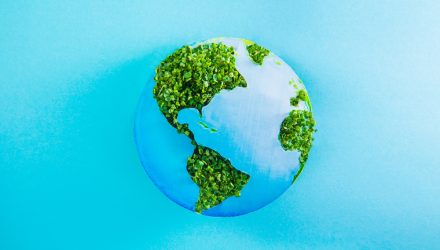In the spirit of Earth Day, investors can turn to environmental responsibility-themed exchange traded fund strategies.
Environmental responsibility refers to our responsibility to use natural resources carefully, minimize damage, and ensure these resources will be available for future generations. Creating a sustainable environment means tackling global issues surrounding climate change, biodiversity, water stress, and toxic spills and releases, to name just a few.
For example, according to ETF Database, ETFs can be ranked based on their exposure to sustainable impact solutions. An ETF’s exposure to sustainable impact solutions is the portfolio-weighted average of each company’s percent of revenue generated by sustainable impact solutions goods and services. Sustainable impact solutions exclude revenue from companies with negative externalities, which are very severe and severe ESG controversies. Sub-categories include ESG Ratings of CCC and B, direct involvement in predatory lending, involvement in controversial weapons, generating more than 5% revenue from conventional weapons or firearms, and realizing more than 10% revenue from alcohol or tobacco production.
The top ETFs based on sustainable impact solutions percentages include:
- iShares MSCI Global Impact ETF (SDG): 72.45% rating
- KraneShares MSCI China Environment Index ETF (KGRN): 71.59% rating
- ALPS Clean Energy ETF (ACES): 68.97% rating
- Invesco Solar ETF (TAN): 64.5% rating
- Global X CleanTech ETF (CTEC): 62.05% rating
Investors can also look to clean energy ETFs, which invest in stocks of companies involved in providing goods and services exclusively to the clean energy industry. The largest broad clean energy themed ETFs include:
- iShares Global Clean Energy ETF (ICLN), which has $5.5 billion in assets under management.
- First Trust NASDAQ Clean Edge Green Energy Index Fund (NasdaqGM: QCLN), which holds $2.6 billion in assets under management.
- Invesco WilderHill Clean Energy ETF (PBW), which boasts $2.1 billion in assets under management.
- ALPS Clean Energy ETF (ACES), which includes $962 million in assets under management.
- Invesco Global Clean Energy Portfolio (NYSEArca: PBD), which has $418 million in assets under management.
The growing popularity of socially responsible investment strategies continues to grow unabated. In response to the rising demand within the investment community, money managers have come out with countless new strategies to help investors target sustainable market sectors.
For instance, among the new launches in 2021, Global X has launched the Global X Clean Water ETF (AQWA), which tries to reflect the performance of the Solactive Global Clean Water Industry Index. AQWA seeks to invest in companies advancing the provision of clean water through industrial water treatment, storage and distribution infrastructure, as well as purification and efficiency strategies, among other activities.
BlackRock also recently launched two active sustainable ETFs for the transition to a low-carbon economy. The BlackRock U.S. Carbon Transition Readiness ETF (LCTU) and the BlackRock World ex U.S. Carbon Transition Readiness ETF (LCTD) invest in large- and mid-cap companies. BlackRock systematically overweights or underweights individual companies relative to their benchmark based on their low-carbon economy transition readiness score for the two new funds.
The two BlackRock ETFs seek to outperform their benchmarks over the long-term by investing in companies that may be better-positioned for the transition to the low-carbon economy. To capitalize on the energy transition, BlackRock’s Sustainable Investing unit has developed and managed a proprietary strategy with institutional investors since 2018. The funds leverage a range of structured and unstructured data sources, advanced analytics, and research-driven insights across five “pillars” (fossil fuels, clean technology, energy management, waste management, and water management) to derive a unique low-carbon economy transition readiness score for each company.
For more news, information, and strategy, visit the ESG Channel.

